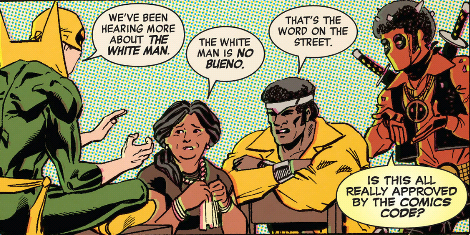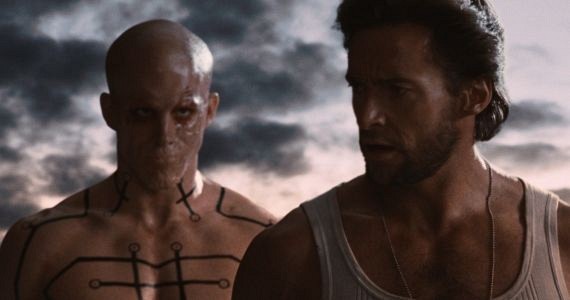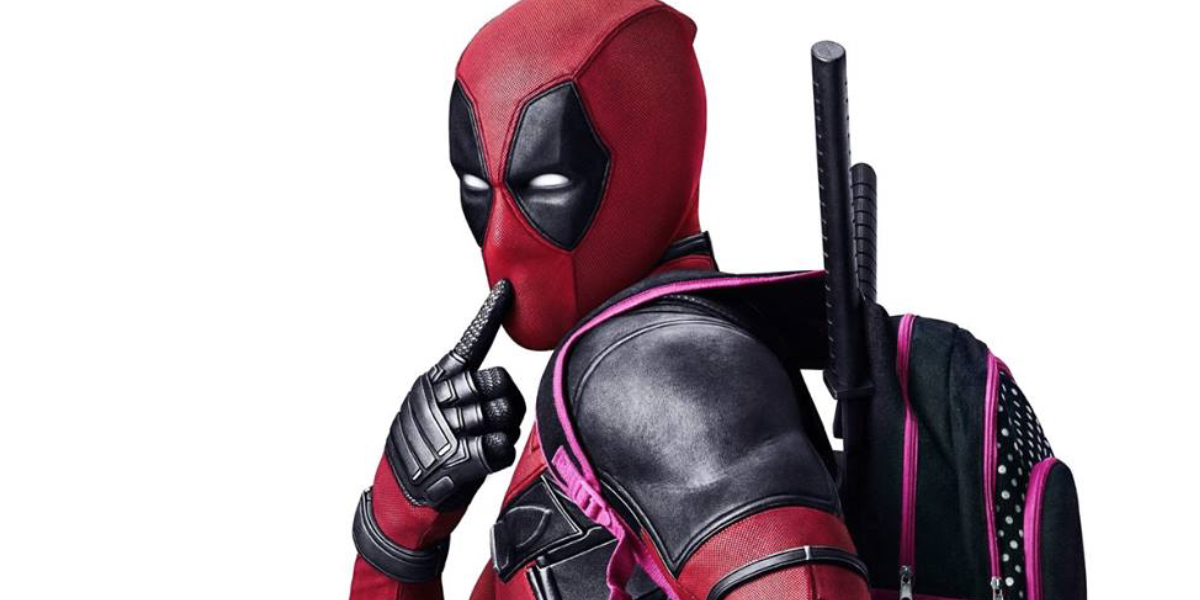Deadpool is a runaway success. That’s a weird sentence to hear, isn’t it? If one had told me in 2009 – a comic book novice at the time turned rather casual comic book peruser of today – that the guy without a mouth Ryan Reynolds played in X-Men Origins: Wolverine would not only get his own movie, but that it would be R-Rated, quite funny and extremely successful at the box office, I’d obviously be puzzled. Then again, May of 2009 was a time on the cusp of evolution in terms of something nearly long forgotten: R-rated blockbusters. Much of my childhood was dominated by the new millennium emphasis on PG-13 blockbusters, primarily in the superhero genre. Now, the few R-rated blockbusters we’ve been getting lately are either military centered dramas that emphasize on the brutality of the violence or Judd Apatow style comedies that lay the weed & dick jokes (and actual showing of said dicks and weed) on thick.
Deadpool lies somewhere in the middle, emphasizing the dick jokes and violence with equal measure without ever forgetting an overall sense of fun. In the last few days, articles have been pouring in about the success of Deadpool, mainly within the context of how it will change the superhero genre and remove it from those predictable smoothed edges. It’s a worthy perspective to discuss, especially given a year where we’re seeing five more high profile superhero themed productions come in with more traditional sensibilities. But Deadpool has larger ramifications than merely seeing the first R-rated superhero film since Wesley Snipes killed vampires while screaming “motherfucker” in the Blade series. With it’s record obliterating $150 million opening weekend, Deadpool also has the potential to resurrect the long thought rare concept of R-rated blockbusters outside of the genre. Of course, this wasn’t always the case. The 70s New Age of Hollywood brought us plenty of darker brooding cash cows like The Godfather films or Saturday Night Fever. Those films captured the zeitgeist of the time, whether it be through The Godfather‘s themes of behind the curtain machinations that mirrored America’s own distrust of its own Vietnam era government or Saturday Night Fever’s evocative encapsulation of the then popular disco scene.

But Deadpool‘s humorously unheroic actions don’t resemble films of that era as much as it does the R-rated comedy action films of the 1980s, namely one of the biggest: Beverly Hills Cop. The Eddie Murphy vehicle remains the sixth highest grossing R-rated film of all time and was a complete accident, given its inception as a Sylvester Stallone no-nonsense actioner. But the formula of inserting the subversive comedic persona of Murphy’s Axel Foley into a traditional action structure worked incredibly well before evolving into the Lethal Weapon franchise’s own mega success twist on the same genre that became a cliche in of itself. In this case, the subversion of the traditional stoic character that felt left over from many a Dirty Harry knock off was what people strongly responded to and came out in droves for. Eventually, Deadpool took the same tact by putting an extremely subversive character within a traditional superhero origin story, paying off massively for FOX.

Still, even if Deadpool resembles something more in line with the sillier R-rated blockbusters of before, could we see more risky R-rated films being given the big treatment thanks to its success? James Gunn recently posted a lengthy response to what he felt Hollywood would incorrectly take from Deadpool, that instead of allowing filmmakers with voices to play in their own sandbox they’d “just be copying what came before them” in the same way that other upcoming films were trying to meekly copy the formula of Guardians (I’m looking at you, Suicide Squad). I think he’s on the nose with all of this, especially since this has occurred consistently with recent successful R-rated films. In the wake of The Hangover becoming the highest grossing R-rated comedy of all time, we got many a glut of set piece driven raunchy comedies in a similar vain like Ted or Horrible Bosses. Thus in addition to the possibility of R-rated superhero films, we could be gearing up for a series of self aware comedy actioners. But that’s not a type of schtick that can consistently work. After all, that same line of logic got us plenty of terrible Die Hard rip offs in the 1990s. I’m not into the idea of “Deadpool in a _____.”

No, I think the lesson from Deadpool is simply that R-rated films can be worth the investment. That the more hard edged content isn’t inaccessible. Horror films have slowly been proving this, with James Wan’s The Conjuring and many a Blumhouse production showing that people will go to non-PG-13 low budget horror films. Yet, there’s also a danger of going too far with the lack of boundaries to being inappropriately harsh for an individual story. Deadpool‘s success could easily backfire into something like the current DC Extended Universe of films going too far with characters who don’t need that R-rated edge. That being said, the upcoming Ben Affleck directed Batman solo project could easily benefit from that push if it’s more of a Gotham crime story. The same could be said for other genre fare that’s been shackled by the PG-13 rating, particularly all of the bloodless action schlock that’s limited the chances of films like The Raid or even Dredd.
Hopefully, this can also lead into a sort of modern slant on the Hollywood New Age, where we get studios more willing to take chances on lower budget films that don’t pull punches on modern issues. Sure, Deadpool is essentially an R-rated cartoon delving out vulgarities, but the same hype and low budget model can be applied to a more serious hard edged film. If anything, Deadpool shows a lack of interest from modern audiences in the status quo that can be exploited by the studio system even by far more serious avenues. There’s even a recent precedent for this, given a disturbed thriller about the state of modern journalism like Nightcrawler can capture people’s attention enough to make roughly four times its meager budget. Now with Deadpool‘s success, more films with blunt social messages and mature themes can come sliding in between larger vulgar films along the way. With Deadpool, the doors are open for whatever R-rated edges could come, both big and small in scope. Who knew that a character known for chimichangas and pop cultures references could open doors for serious topics… you know, aside from testicular cancer?








